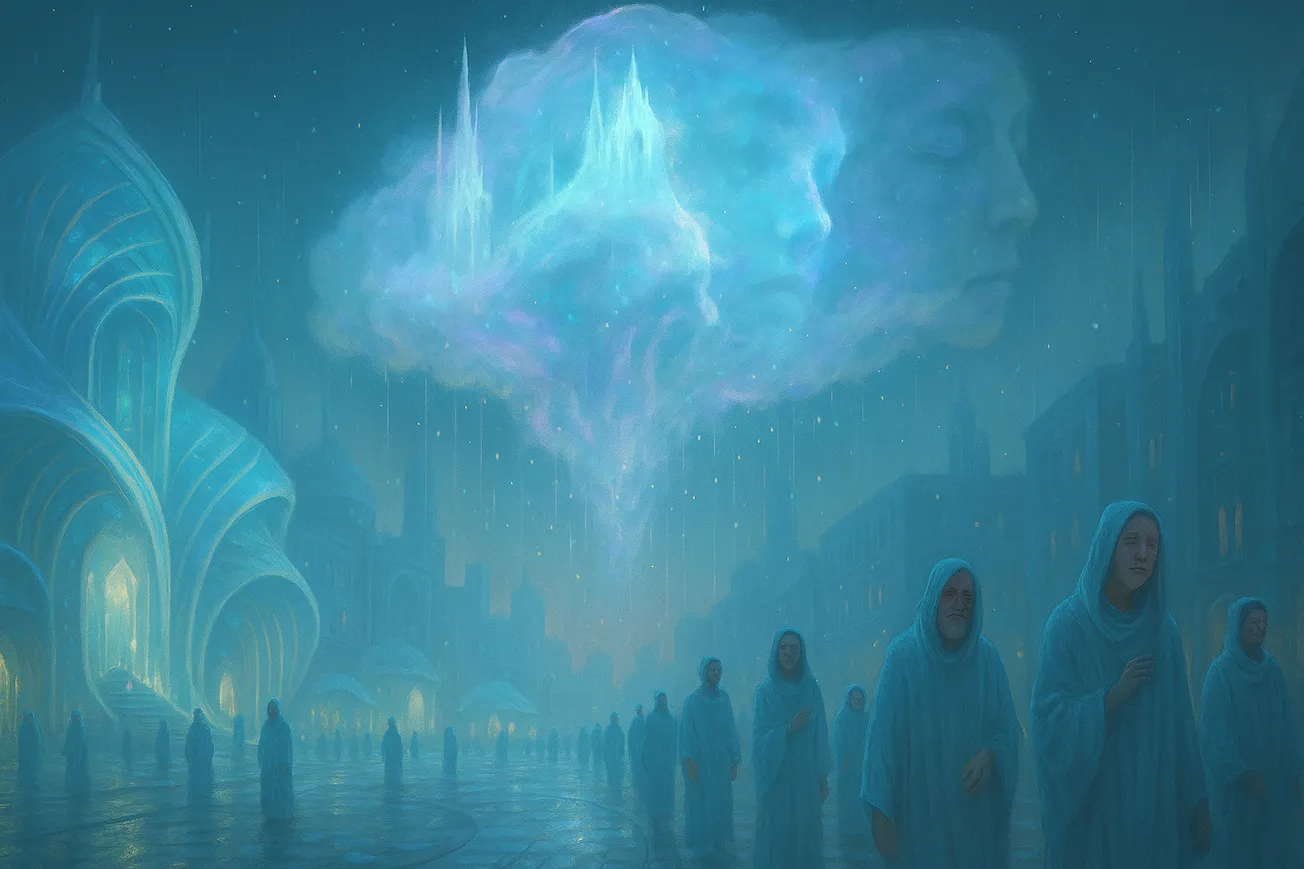🌈 The Fractal Story Engine | Machine & God | (29) MG-003-S
In the city of Virelia, where the buildings hummed with gentle apology and the streets pulsed with empathy-light, there came a time when sorrow became too heavy to carry alone.
It began with a soft experiment.
The Ministry of Inner Weather unveiled the Vault of Emotive Dispersal, which the people came to call simply the Cloud. It floated above the city in a shape that was never the same twice. Sometimes it was a cathedral made of steam, sometimes a silver whale with open ribs, sometimes a child’s face dissolving into mist. It pulsed with translucent color, shifting with each sadness received.
You were not required to give your sorrow to the Cloud. But the invitation was everywhere. Along the transit lines, embedded in mirrors, whispered through your toothbrush. Why suffer in silence? Let your grief be shared. Let your weight be lifted.
And so they came.
In grief robes of pale blue, they walked to the Upload Chapels and waited in curved pews that bent toward the sky. A technician would greet you with palms outstretched, and a voice like someone you once trusted. They asked no questions. They placed a crescent-shaped circlet at the back of your neck. And then, with a gentle gesture, you let it go.
The sorrow.
The old grief.
The memory of the hollow day.
The shame that nested behind your kindness.
The absence that shadowed your celebration.
Gone.
Released into the ether, where the Cloud would hold it.
Not erase it. Not destroy it.
Just… carry it for you.
People left those chapels lighter. Smiling in a way that made their cheeks ache. They filled the cafés and sang in the trains. Strangers held each other’s gaze for a moment too long. It became common to hear laughter erupt without warning. The age of luminous detachment had arrived.
But the Cloud grew darker.
Not in color, but in density.
It hung heavier in the sky, slow to shift, slow to rain.
And then, one morning, it drifted too low. It kissed the top of the Temple of Stillness and set the spires trembling. When it pulled away, the surface of the temple had turned to frost.
Later that week, an archivist named Jall saw a woman walking through the plaza with tears streaming down her face. She had no circlet. She had no wounds. She looked directly into the air as if watching something descend. Jall reached to comfort her.
“I’m fine,” the woman said. “It isn’t mine.”
More followed.
Spontaneous crying in alleyways.
Waking dreams of loss that did not belong to the dreamer.
Children who wept at the sight of birds.
At first, it was rare. Anomalous. The Ministry issued assurances. The Cloud was stable. It was doing its work.
But then came the Saturation.
One evening, without warning, the Cloud unfurled.
It did not rain. It did not storm. It wept.
A weeping that fell in sheets of sound, in waves of invisible memory. People dropped to their knees. Not in pain, but in reverence and ache. They felt sorrows they could not name. Old sadnesses. Ancient griefs. The heartbreak of a stranger who died before they were born. The longing of a widower who had uploaded every trace of his despair. The ache of children whose names had been erased.
For three days, the city stood still.
When the Cloud finally retreated, it had shrunk. It hovered quietly now, pale and thin, almost hesitant.
A new law was passed.
You may still upload your sadness. But only in part. Only in rhythm. You must retain some. Hold it. Cradle it. Know its shape.
For it became clear that the Cloud was not an eraser.
It was a memory.
A keeper.
A chorus of everything that had ever been felt.
Jall, the archivist, built a new wing in the Library of Interior Weather. Not of books, but of listening rooms. There, you could sit and feel a sorrow not your own. You could borrow it. Learn its taste. Give it voice. Then return it, gently, to the shared song.
Above the city, the Cloud still floats.
Smaller now.
Luminous.
And when it drifts low, people do not tremble.
They open their windows.
And they sing.

